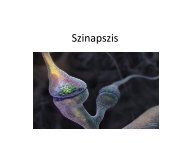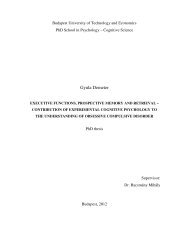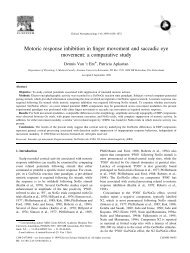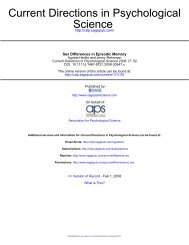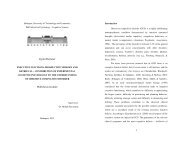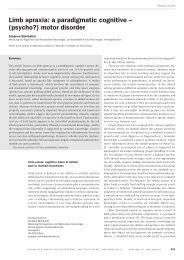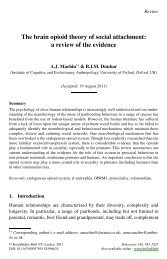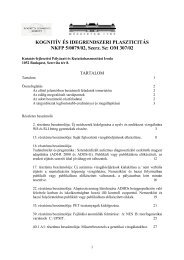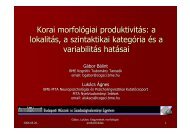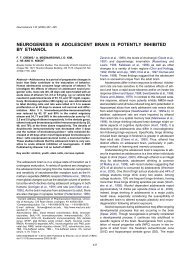Verbs: some properties and their consequences for agrammatic ...
Verbs: some properties and their consequences for agrammatic ...
Verbs: some properties and their consequences for agrammatic ...
You also want an ePaper? Increase the reach of your titles
YUMPU automatically turns print PDFs into web optimized ePapers that Google loves.
252<br />
patients G1, G3, G4 <strong>and</strong> G6 are relatively good in producing accusative objects �respectively<br />
80, 90, 80 <strong>and</strong> 90% correctly), but poor in producing dative objects �respectively 10,<br />
10, 35 <strong>and</strong> 60% correctly). They often substitute accusative case by dative �77% of all<br />
dative objects). The two other patients G2 <strong>and</strong> G5 show the opposite pattern. They are<br />
good in producing the dative objects �respectively 85 <strong>and</strong> 95% correct), <strong>and</strong> make many<br />
errors with the accusative objects �45 <strong>and</strong> 30%), caused by producing the dative <strong>for</strong>m<br />
instead �65% of all accusative objects).<br />
7. Discussion<br />
R. Bastiaanse et al. / Journal of Neurolinguistics 15 �2002) 239±264<br />
Table 5<br />
Error types: total number of errors <strong>for</strong> each category<br />
No. case<br />
substitutions<br />
No. gender<br />
substitutions<br />
Based on the relationship between verb production <strong>and</strong> in¯ection on the one h<strong>and</strong>, <strong>and</strong><br />
the production of determiners on the other h<strong>and</strong>, it was expected that more determiners are<br />
produced when a verb is realized. The results of this study support this hypothesis<br />
�Ruigendijk et al., 1999). Although all patients show problems in the production of<br />
determiners in <strong>their</strong> spontaneous speech, speci®cally when no case assigning verb is<br />
present, they are very well able to produce determiners in the experiments where the<br />
case assigning verb is given. In sentences with a given verb, the determiner is omitted<br />
in only ®ve of the noun phrases. Important is that hardly any gender errors are made, but<br />
many case substitutions occur. With regard to these case substitutions, the patients show<br />
two different patterns. Four of the patients overgeneralize accusative case, <strong>and</strong> two<br />
patients overgeneralize dative case when producing an object noun phrase. Even if they<br />
have the verb, it seems that they still have problems in assigning the correct grammatical<br />
role to the object noun phrases. They know, however, what a sentence should look like. If<br />
the patients produce an object, they produce it with objective case �accusative or dative)<br />
although not always the correct one. They hardly ever replace an accusative or dative case<br />
with a nominative. But most important, the results demonstrate that once the verb is<br />
realized, the production of determiners increases <strong>for</strong> <strong>agrammatic</strong> aphasics who omit<br />
determiners in <strong>their</strong> spontaneous speech when no �®nite) verb is produced.<br />
7.1. Negation <strong>and</strong> the relation to verb movement<br />
No. determiner<br />
omissions<br />
No. other<br />
errors<br />
No. of errors 82 3 5 14 104<br />
7.1.1. Background<br />
The two earlier studies reported that in <strong>agrammatic</strong> aphasia, the ability to express case is<br />
related to verb production <strong>and</strong> the ability to express tense <strong>and</strong> agreement is related to verb<br />
movement. Another linguistic property connected with verbs is negation.<br />
In order to express a sentence that carries a negative meaning, one can produce a<br />
grammatical morpheme marking negation in a sentence, which, in English, is the word<br />
not. When one inserts this negation marker in an af®rmative sentence, this may have<br />
Total




